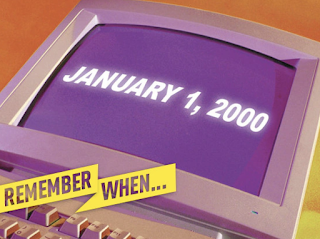I have been nervously following the deployment of the James Webb Telescope:
Almost immediately following its launch, it was beyond any servicing mission NASA could deploy. Every time I find myself in awe of its intricate, engineering origami dance, I have to remind myself that this performance is no lucky break. The telescope was originally scheduled to launch in 2007. Although its delayed launch led to a fatalistic feeling of 'this thing will never happen', the many, many delays have, no doubt, contributing to its (thus far) flawless performance.
Before my students and my own children were born, it was popular to deride the overblown fears of the 'Y2K' problem.
After much fretting and overblown apocalyptic fears of societal collapse based on the real problem of computer code in 1900's only storing the year as its last two digits (thus forcing division by zero and negative time operations once the year became '00'), it was popular to completely dismiss the 'Y2K' problem as a joke. (Kids, imagine a time when memory was so expensive they shaved off the first two digits of the year in order to save money!)
Here's the thing: Y2K was a real problem for particular operations in the banking and other computer-based industries that use the year in their calculations. Those in the know quietly fixed the mission critical lines of code and hardware while the rest of the world went crazy and stockpiled cans of beans and worried if their toaster was Y2K compliant. The reason we could all laugh at it is precisely because the problem was fixed (although it was comically overblown by the non-technologically savvy).
Both of these seem related to the well known phenomenon of negative cognitive bias: We tend to remember and dwell on our personal failures and discount our successes.
As I get older, I find I am getting a bit better at acknowledging this. Yes, there was no Y2K disaster and, yes, the James Webb Telescope is performing marvelously and, yes, I have done some good things in my life.
I could dwell on never getting my PhD, never doing any ground-breaking research, never writing that science fiction novel, trying and discarding different careers until I found satisfaction as a teacher at 32, etc. But, instead, I am taking a moment to think on my lovely wife, my two wonderful children, and twenty years of sharing my passion for physics with students. Sure, my mind drifts to the failures of yore but I can acknowledge all the successes that led me here too, can't I?
I plan to take some time in '22' to explore some wonderful, mind-expanding pictures taken from beyond the orbit of the Moon with my students and my family. The path here was filled with failures and successes. I will try to think and appreciate them both in equal measure.
"If you are only skeptical, then no new ideas make it through to you. You become a crotchety old person convinced that nonsense is ruling the world. (There is, of course, much data to support you.) But every now and then, a new idea turns out to be on the mark, valid and wonderful. If you are too much in the habit of being skeptical about everything, you are going to miss or resent it, and either way you will be standing in the way of understanding and progress" - Carl Sagan











No comments:
Post a Comment